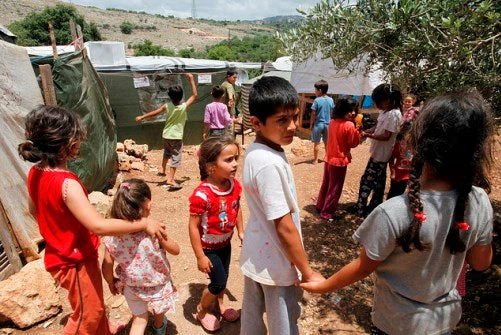
Ipsos, a global polling firm, surveyed 2,200 refugee families living in Jordan and Lebanon in March and found that, unable to find regular work, nine out of ten families depend on some kind of aid. Most refugees live in private accommodation, not camps, and spend most of their money on food and rent. Education was valued by 79% of those polled, but a lack of quality provision and physical, social and economic barriers prevent the refugees from sending and keeping their children in school.
There are no easy solutions. However, the British Council believes that with its long-established expertise across the Middle East it can improve the quality of language teaching in neighbouring countries to Syria. Supporting teachers, principals, education officials and children will give them the skills they need to regain control and move on with their lives.
We know this works. In Zaatari camp in Jordan, we have partnered with Relief International to train English teachers. Having a foreign language skill helped Syrian pupils get university scholarships and find jobs with international organisations.
Acquiring a second language can also offer young adults opportunities for vocational training and meaningful employment. The Ipsos survey found that only 23% of Syrians in Jordan and Lebanon are working, and more than half of those are in low-paying temporary jobs.
Once given the opportunity to work or study, refugees can start earning money to support themselves or their families. Put simply, they become more resilient.
Besides work, other benefits concern lifestyle and self-expression. Ipsos found that 77% of Syrians polled are extremely frustrated at having to start over in a new country, and only one in ten take part in any kind of leisure activity. Such isolation adds to resentment and blocks integration, but learning a new language offers fresh social opportunities.
Back in the classroom, a new language also offers an outlet for pupils to express feelings of loss, fear and despair . Most families who fled Syria have traumatic stories to tell - research has found that allowing children to express these in a neutral language helps deal with pent-up emotions and again, develops resilience.
For teachers too, the changes have been dramatic. The British Council works intensely with education authorities in Jordan and Lebanon, where state schools have been overwhelmed by refugee numbers, many running double shifts – local children and established Syrian pupils in the morning, new Syrian arrivals in the afternoon.
Integrating these pupils is a major challenge, so we have devised professional development courses offering teachers and school inspectors new and creative classroom methods.
Our philosophy is to keep Syrian pupils engaged and bring them into the educational mainstream as soon as possible. This training programme has so far reached 128,000 students in the two countries.
So which language should they learn? Of course, our speciality is English – the British Council is the world’s biggest supplier of English language training with a reach across the globe.
But we are also working in French in Lebanon, partnering with the Institut Francais du Liban, and we will support other colleagues and languages around the MENA region wherever we can, to spread these valuable skills.
One final statistic from the Ipsos survey - if the war were to end, 85% of those questioned said they would return within six months. The vast majority of Syrians don’t want to stay in other countries . They yearn for their homeland. Acquiring language skills will, we believe, help them break out of dependency and helplessness by developing real resilience.
Armed with the confidence to communicate, the so-called “lost generation” will have the chance to move forward to a future of opportunity and hope.
The British Council’s new ‘Language for Resilience’ report examines the impact of language on refugees and host communities affected by the Syrian crisis. Find out more and download the report here .


Join the Conversation
I'm a bit confused by this blog. If so many kids are not in school, what is the point of training English teachers? Are these teachers going into the refugee enclaves themselves, or only going to available schools, in which case, hundreds of thousands of refugee children are still receiving no education? Please clarify. Shouldn't there be an attempt to organize schools where the refugees live and... give the kids an education on the ground?
Read more Read less